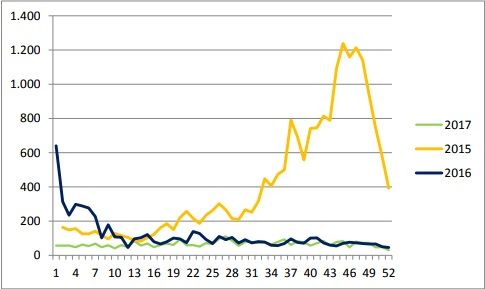There is no doubt the government’s more stringent legislation on refugees in the wake of the refugee crisis in 2015 is having an impact.
Last year, just under 3,500 people applied for asylum in Denmark – the lowest number registered since 2008, when about 2,400 applied.
“When they [refugees] flooded across the Danish border, we had a difficult time keeping up. But now things have calmed down and fewer refugees means fewer challenges for the municipalities, so they can work on finding people employment,” said the immigration minister, Inger Støjberg.
“Across the nation we are still struggling to handle the many thousands of people who came during the refugee crisis, and we can see from the employment figures that there is still a long way to go. So fewer refugees means a lot.”
READ MORE: Denmark has one of Europe’s worst asylum approval rates
Helping them at home
Støjberg and the government have worked hard to curb the flow of refugees to Denmark. Aside from establishing border controls with Sweden and Germany, the government has passed 67 laws since 2015 aimed at making it more difficult for refugees to settle in Denmark.
In 2015, over 21,000 people applied for asylum in Denmark – a figure that fell to just over 6,000 in 2016 and then to 3,458 last year (although some delayed registrations are expected).
“There is little doubt that our tough immigration course has become well known outside our borders, and that was precisely the effect I was looking for,” said Støjberg.
“I’ve never questioned that refugees look at what they can get from different European nations as far as welfare goodies are concerned, and the government has pulled the carpet on the Danish ‘gift shop’. Moreover, the EU agreement with Turkey has had a significant impact on halting the refugee flow.”
Støjberg went on to say that the government has set aside a record amount to help refugees in their own areas and thereby prevent them from undertaking the perilous journey to Europe.














